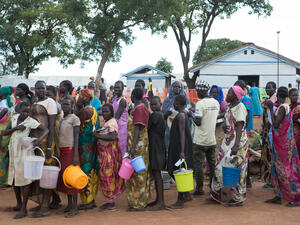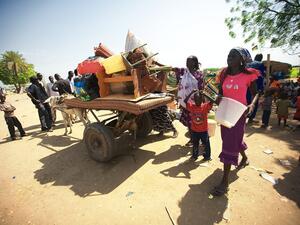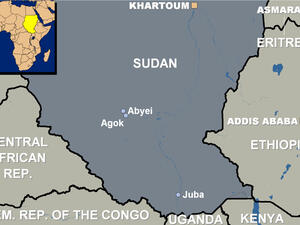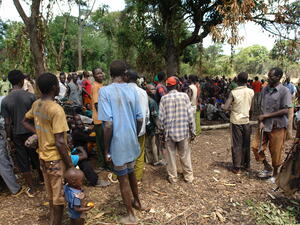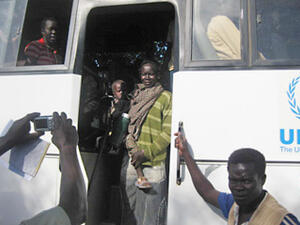Agreement in Ethiopia paves way for Sudanese refugees to return home
Agreement in Ethiopia paves way for Sudanese refugees to return home

A southern Sudanese refugee family cooks dinner in Bonga camp, in western Ethiopia. They are expected be part of the first group to be repatriated soon to their homeland.
ADDIS ABABA, Ethiopia, Feb. 27 (UNHCR) - An agreement paving the way home for some 73,000 South Sudanese refugees currently in Ethiopia was signed on Monday between the UN refugee agency and the Ethiopian and Sudanese governments. The first repatriation movement from the camps in western Ethiopia is expected to take place in March.
"It gives me immense pleasure to sign this agreement on behalf of UNHCR," said UNHCR's operations director for the Sudan Situation Jean-Marie Fakhouri. "However, this meeting is a ceremony and hopefully all parties will work together for the successful implementation of the commitments made through this agreement."
The tripartite agreement signed in the Ethiopian capital Addis Ababa, sets out the legal framework for the repatriation and the roles and obligations of all three parties. It includes crucial provisions on the voluntary nature of the returns in safety and dignity.
"UNHCR would like to start the voluntary repatriation from Ethiopia by mid-March. Ten thousand refugees could voluntarily go home before the rainy season in South Sudan sets in," Fakhouri said.
The 73,000 refugees live in five camps in western Ethiopia - Bonga, Dimma, Fugnido, Sherkole and Yarenja. Most of the refugees arrived in Ethiopia in 1983 and in the 1990s as a result of the civil war in South Sudan.
While the desire to return home is strong, UNHCR is concerned over the severe funding constraints it's facing for its return and reintegration operations in South Sudan. It has received only US$8 million of the US$63 million needed in 2006.
UNHCR, together with the government of Sudan, UN agencies, NGOs and other partners, is trying to ensure minimal conditions are in place so that refugees and other displaced people can return to a minimum of basic services in their war-devastated region.
Fakhouri called on the international community to support the repatriation and reintegration process in South Sudan to ensure its sustainability and contribute to consolidating the peace.
The Comprehensive Peace Agreement (CPA) that ended 21 years of north-south civil war in Sudan was concluded in Naivasha, Kenya, in January 2005 - just over a year ago.
"The pledges made in Oslo at the Donors' Conference for Sudan last year must deliver their promises for the over 350,000 Sudanese refugees in the region to go back home and resume normal life," said Ethiopia's state minister of the foreign affairs ministry Dr. Tekeda Alemu, who signed the tripartite agreement.
Brigadier Aleu Ayieny Aleu who signed for Sudan thanked the Ethiopian government and its people for taking care of the refugees for so many years and called on the refugees to return home and help rebuild their country.
Brigadier Aleu also recognised the burden that hosting a refugee population can impose on a country.
"Refugees involuntarily and out of necessity contribute to environmental degradation and it is my earnest appeal to the international community to assist Ethiopia's post-repatriation activities as well," said the Sudanese state minister, who previously was a refugee in Ethiopia's Itang camp.
So far, 14,000 Sudanese refugees have asked UNHCR to help them return home in 2006 - the first will be from Bonga camp returning to the Blue Nile Province in South Sudan. UNHCR expects more refugees will sign up for the organised return as soon as the first repatriation convoys start.
To help refugees make an informed visit about returning, UNHCR is planning "go-and-see" visits from Ethiopia to South Sudan in the second week of March. Under this scheme, refugee representatives visit South Sudan and then return to inform the other refugees about the living conditions in the places of return.
Under the agreement signed today Ethiopia pledged to continue to safeguard the rights of refugees who decide to stay in Ethiopia for now. There are some 350,000 South Sudanese refugees in neighbouring countries, and four million more Sudanese displaced within their own country.
By Kisut Gebre Egziabher in Addis Ababa, Ethiopia


